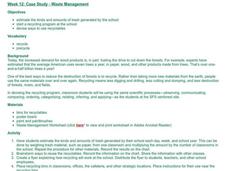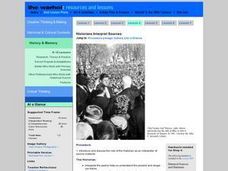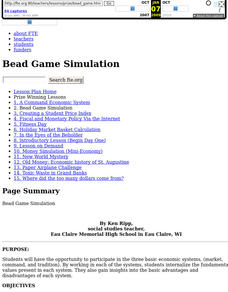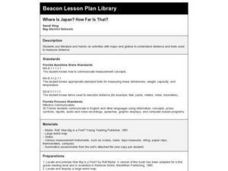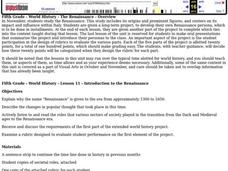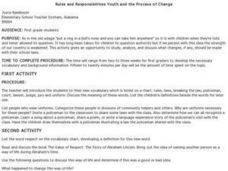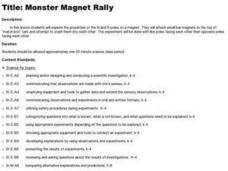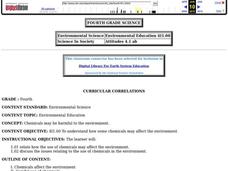Curated OER
Moving West with the Forts: Using an Interactive Map
Students discern a map of Texas and it's forts in the early to mid-1800's. From this map they analyze movement from the moment Texas became a state to its involvement in the Civil War.
Curated OER
Moving West with the Forts: Using an Interactive Map
Seventh graders practice reading maps and locating the forts stationed in Texas. Using the internet, they analyze westward movements from statehood to the Civil War. In groups, they complete a worksheet about the forts and share their...
Curated OER
Two Ways of Life
Students visit Internet sites to compare ways of life of Indians on western Texas frontier and U.S. military men at Texas forts, and draw pictures to illustrate clothing, transportation, weapons, and shelter of both Indians and U.S....
Curated OER
Waste Management
Students set up a recycling program in their school. They first estimate the kinds and amount of trash generated and brainstorm ways to reuse the recyclables and create flyers explaining how their program will work at the school.
Curated OER
The Study of the Spanish-Speaking People of Texas: Daily Life
Students analyze the different ways that photography helps historians understand the lives of people who lived in the past. They examine images from Russell Lee's photo essay and discuss how Texas' has changed from an agrarian to an...
Curated OER
Historians Interpret Sources
Students read excerpts from the historian Conover Hunt writing about John F. Kennedy and from primary source documents using the handout: Historical Sources and Historians. Students discuss and identify source types, evaluate sources,...
Curated OER
Wetlands/Watershed Model
Students make a model that will demonstrate the flow of surface water across the land in Texas and how materials that originate many miles away can end up in the wetland along the coast.
Curated OER
Bead Game Simulation
Students have the opportunity to participate in the three basic economic systems, (market, command, and tradition).
Curated OER
Where Is Japan? How Far Is That?
First graders use literature and hands-on activities with maps and globes to explain distance and tools used to measure distance. They select tools to measure various objects in the classroom, then apply those concepts to their map...
Curated OER
Flat Stanley Letter
Fourth graders write a letter requesting that the recipient assist the student in his/her Flat Stanley project.
Curated OER
The Renaissance
Fifth graders examine the rise of the Renaissance and the contributions and roles of various groups such as ancient Greeks, Muslim scholars, the aristocracy, the Catholic Church, and tradesmen. They develop and write a report on a...
Curated OER
Rules and Responsibilities Youth and the Process of Change
First graders learn vocabulary in regards to laws, courts, and policeman. They read and discuss the book, The Value of Respect: The Story of Abraham Lincoln. An attorney visits the classroom and discusses the roles of judges and juries.
Curated OER
Welcome to My Neighborhood
Students create pictures of neighborhoods and label the people and objects with Spanish words and phrases.
Curated OER
You CAN Make a Difference!
Young scholars identify environmental issues affecting their community and determine ways they can address the issues. They explain that they can be catalysts for change regarding the environment in their own communities.
Curated OER
Lawton: A Child of the Prairie
Students complete word study activities, read a story and write a descriptive paragraph about the setting of Goo Goo Avenue in Lawton 1901.
Curated OER
Traffic Watch with a Palm
Students, in groups, interpret data about traffic using Palm technology.
Curated OER
Action Research Project
Young scholars find an issue with the government, research it, and then present it.
Curated OER
Monster Magnet Rally
Students explore the properties of the N and S poles on a magnet. They attach small bar magnets to the top of "match box" cars and attempt to crash them into each other. They each write a summary describing their findings.
Curated OER
Wetlands/Watershed Model
Students work together to create a watershed model. They discover the flow of surface water on different topography. They examine how materials originate from miles away and end up in a different wetland.
Curated OER
Environmental Science
Fourth graders examine how the use of chemicals may affect the environment and how their are many different political issues surrounding chemical usage and the environment. They research different newspapers and magazines about the issues.
Curated OER
Fire Wars
Students identify fire risk factors for a property located near a wildland area. Students discuss ecosystems subject to wildland fire and consider what could be done to eliminate the problem.
Curated OER
Rotation Sensor Challenge
Students participate in a challenge to construct a rotation sensor with the highest degree of accuracy and repeatability. They conduct computer analysis of their sensor using repeated trial.
Curated OER
Collaboration and Communication Tools-1
Students use telecommunications and online resources to participate in activities that develop solutions outside the classroom. They use email attachments and FAX to send their finished letters describing why people should or should not...





